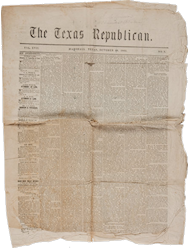[Marshall] Texas Republican, September 22, 1860
For the Texas Republican.
Kaufman, Sept. 8th, 1860.
Mr. Editor:
While a large portion of the Press in this State are continually filled with the most alarming accounts of incendiarism and of excitement of negroes to insurrection, the large part of which perhaps have no foundation in fact, I have been much gratified to see that your paper is lending its large influence to conserve the peace of society by the able articles you have published from your own pen and others, on this subject. Having been absent from the State for sometime past, and to which I have but just returned, I have but little personal knowledge of what has been taking place at home, but I do know that the exaggerated accounts published, are having a very injurious effect in preventing emigrants from even the Southern States settling among us, and also in the withholding of foreign capital so greatly needed to help forward our internal improvement enterprise.
It appears to have been represented by most of the papers, that almost every town, particularly in eastern and northern Texas has been burnt, and that the negro’s have not only been excited to insurrection, but that large quantities of poison has been found in their possession, for the purpose of destroying the white families to which they belonged; most of which reports are untrue so far as I have been able to ascertain.
In some of our counties we have a considerable population from the free States, and who are in general, a worthy class of citizens, while I am also satisfied that there are some abolitionists among them, who have given “aid and comfort” to others from abroad of the same stripe. The violent expulsion of certain abolitionists by the whip, instead of the rope, it is reasonable to suppose, excited a spirit of revenge and retaliation, which has probably been the cause of the beginning of the excitement, which when once started ran like wildfire over the country, and almost frenzying the mind of many people. Altho’ the facts in many instances were really startling, yet all sorts of exaggerated and untrue statements have obtained currency, under the fevered state of the public mind.
Your allusion Mr. Editor to the history of the 17th century in regard to the plague, and the witch excitement, may have an applicability to some cases, which it would be serious to contemplate. If persons then from coercion or intimidation, acknowledged themselves as having been the cause of the plague, and under the witchcraft excitement, acknowledged that they had direct intercourse with the Devil and were put to death, may not some of the confessions retorted under the lash, particularly from negroes, partake somewhat of this character. As you truly say, “these things should teach caution” at least.
My only object in writing then, is to allay undue excitement, correct false and injurious impressions, that have went abroad and where our laws provide remedies, I would with yourself and other correspondents urge the enforcement of those laws.
The wheat and corn crops of this county are more than amply sufficient for our own population, but the quantities being taken to the other counties less favored, serves to keep up the prices very high, so that many of our farmers are realizing more cash than they have in more favored seasons, and the citizens here in general will be much better able to meet their engagements than those who depend upon cotton, which not only in Texas, but throughout the cotton states has this year been so great a failure.
There is a peculiar system of agriculture adapted to Texas and particularly to our prairie country, which must be observed to secure good crops. In the first place the lands should be broken up early and subsoiled, so that the winter rains may go down into the earth, instead of running off and being wasted. Besides the early plowing enables the frosts to have a more fertilizing effect upon the soil, and causes it to pulverize much better than it otherwise would do. Preparing the land thus, planting early and pushing the crop forward from the start will prevent the miserable failures so much complained of, while the late shallow surface plowing and half working of crops is in general so much work thrown away.
Although the soil and climate of our rich Prairies are well adapted to cotton, yet the growing of wheat, barley, and other grains, together with the advantages of stock raising, will for many years at least, make them much more profitable for our prairie farmers than the raising of cotton. True there have been some partial failures of our small grain from causes, the most of which might have been easily remedied. Much of our last crop of wheat was winter killed, from not having been put in properly and particularly from not rolling the ground after being sown.
In some future number I would be pleased to enlarge upon this subject, but for the present must close.
Warsaw.
